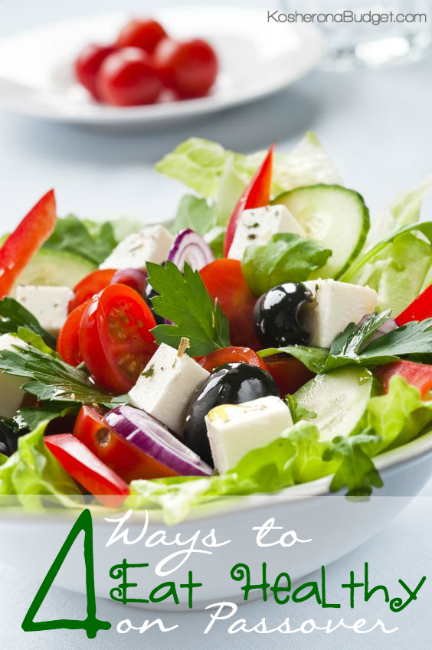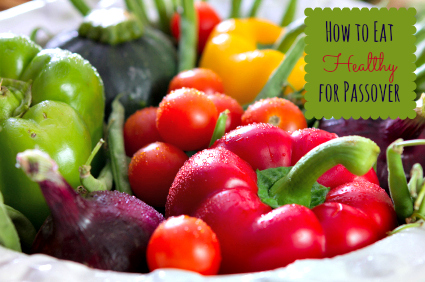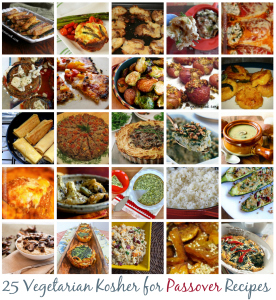
This is a guest post by Nina Manolson, Health Coach and founder of NinaManolson.com
Passover is big business! It’s a 2 billion dollar-a-year business!
When we go to the store, we are inundated with “kosher for Passover” packaged foods. Kosher-for-Passover sodas and cake mixes, kosher-for-Passover Matzah ball mix, chocolates and everything else.
In fact, when I was a kid, I couldn’t wait for Passover, because I knew that the door to our normally healthy kitchen would magically open to all kinds of super salty and sweet packaged foods that my mom usually wouldn’t allow.
I certainly understand reaching for packaged foods because of convenience, as well as the assurance that what you are getting is appropriate for Passover. But that ease has a high price tag attached, and I don’t just mean the dollar sign.
Passover products tend to be low quality foods. They are highly processed, highly sugared & salted, and many of them – understandably – rely on Matzah as a base.
As important as Matzah is as a symbol of Passover, it’s not a food that actually supports our best health. Matzah is made from refined white flour, with hardly any nutrient value. What was once a whole wheat grain has been stripped of it’s bran (fiber) and wheat germ (protein). All we are left with is the simple starch. And the tricky thing with eating simple starches is that they turn into sugar in our body.
What we’ve learned about refined sugar in the last 15 years is that it’s a major contributing factor to weight gain, depressed immunity, increased inflammation, pre-mature aging, and so much more.
We of course want the holiday to be festive and full of special foods, but do we really need it to come in the form of packaged macaroons and jelly fruit slices?
Sure, there’s always the thinking of “hey, it’s only once a year!”
That’s true, but what I hear from my vantage point of being a health coach, is that Passover leaves many of us feeling low energy and, well…constipated. The repercussions of holiday eating can throw our healthy habits off for months.
I also know first hand the power of using Passover as a personal ‘reboot and refresh’ time. For the last decade, I’ve stepped into Passover as a personal healthy retreat. I’ve stepped out of Passover feeling energized and realigned with what really nourishes my body and soul.

So, how do we shift Passover into being a healthier holiday?
4 Ways to Eat Healthy on Passover
#1. Buy fresh food
It’s that simple: Skip the packages and go for fresh fruits and vegetables.
#2. Make it from scratch
A lot of the products we rely on can be made cheaper and healthier. Salad dressing for example is often loaded with sugar and thickeners. Stick with olive oil and balsamic vinegar for an easy, healthy, and inexpensive dressing.
Starting from scratch doesn’t have to mean a lot of time in the kitchen. Make recipes that you can double and triple so you are not glued to the stove.
Get five of my favorite healthy and delicious made-from-scratch Pesach recipes that all multiply well.
#3. Skip the white flour matzah
This may seem sacrilegious, and I certainly don’t want you to forego the ritual eating of Matzah, but if you are relying on Matzah meal to bake, it’s time to get to know more nutrient dense flours.
Protein and fiber rich flours like almond meal (simply grind almonds in your blender) or quinoa flour (grind quinoa in the blender) are both kosher for Passover, will increase your energy, and will improve your digestion.
#4. Be moderate in your shopping
There’s a real flurry of shopping and getting ready before Passover. Growing up, our fridge, which was always packed anyway, was suddenly overflowing. Really, the holiday is only 8 days. Be moderate, live without the “kosher for Passover” chips. Use the holiday to pare down to what’s really important.
Enjoy your Pesach! As you know, it’s a holiday about freedom, let that freedom make its way into how you feel in your body.
Nina Manolson, M.A. is a Holistic Health Coach and Psychology of Eating Coach. She is the founder of NinaManolson.com and NourishedWomanNation.com. Her passion is helping busy women who are great at taking care of everyone and everything else, tune back in to themselves, so that they feel energetic and in love with their body and life. She’s been helping women reclaim their bodies for over 20 years in the Health and Wellness field.
















The is whole wheat, oat and spelt matza available, so it’s not necessarily refined wheat as the author states. And of course I am super excited that quinoa is no available with kosher for passover sign, so no need to check in advance!
I mainly agree with the author – I use NO packaged cake, kugel, etc. mixes for Passover. But I strongly believe in having two things – that my kids and husband love – Passover candy fruit slices and my homemade “matzo crack” candy from Marcy Goldman’s cookbook.
These are the junk foods that are offered only during Passover, and anticipated all year round. I think having these things makes it easier for children (of all ages) to comply with the many, many Passover diet restrictions without resorting to those unappealing mixes and or cholesterol laden homemade cakes that contain a zillion eggs.
I am not buying packaged sweets this year – sticking with chocolate (mainly dark Swiss that is also enjoyed year round:)) and dried fruit, such as dates and prunes. Most of the Pesach ready-made deserts are inedible anyway. The only exception is almond macaroons – we just like them and generally eat only on Passover. I also usually make a yummy sweet kugel from matza farfel and whole berry cranberry sauce.
I agree with this article. I don’t buy any of those packaged desserts and “fake chametz” products. I do make meringues tho which are just egg whites and sugar 🙂
As a Lubavitcher I use only the most minimal amount of processed foods, so this is already built-in for me 🙂 And it’s the only time of year when my big noshers will eat fruit, because there’s almost nothing else to snack on!